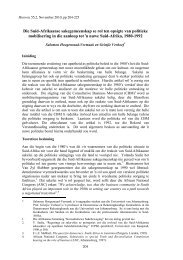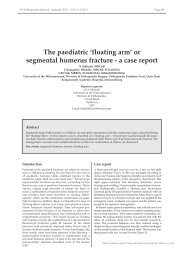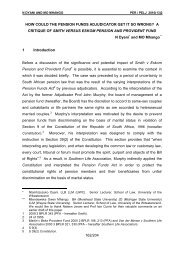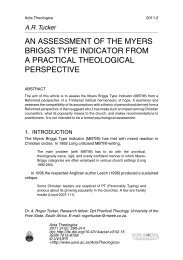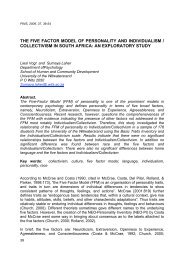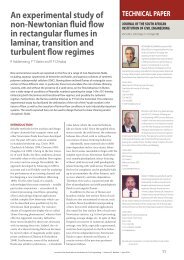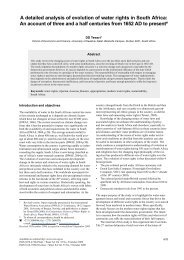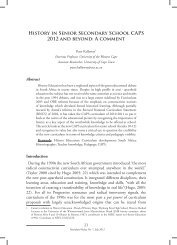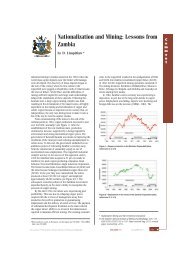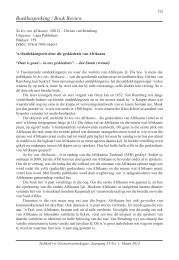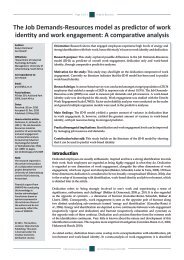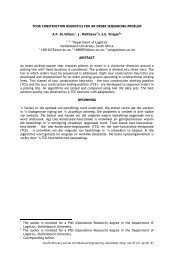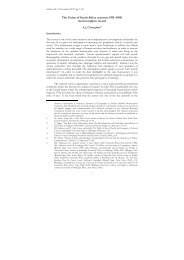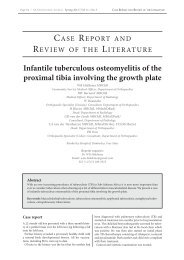91 Hendrik Verwoerd and the Leipzig School of Psychology in 1926 ...
91 Hendrik Verwoerd and the Leipzig School of Psychology in 1926 ...
91 Hendrik Verwoerd and the Leipzig School of Psychology in 1926 ...
You also want an ePaper? Increase the reach of your titles
YUMPU automatically turns print PDFs into web optimized ePapers that Google loves.
<strong>Hendrik</strong> <strong>Verwoerd</strong> <strong>and</strong> <strong>the</strong> <strong>Leipzig</strong> <strong>School</strong> <strong>of</strong> Pscyhology<br />
<strong>the</strong> “primitive peoples” (totemism) <strong>and</strong> <strong>the</strong> “age <strong>of</strong> gods <strong>and</strong> heroes”. 73<br />
Similar to o<strong>the</strong>r <strong>the</strong>ories <strong>of</strong> <strong>the</strong> time, Wundt’s ethnopsychology judged <strong>the</strong>se<br />
societies accord<strong>in</strong>g to European cultural values, juxtapos<strong>in</strong>g all as “primitive”<br />
compared to <strong>the</strong> “advanced” Europeans. Massive European ethnocentrism<br />
was <strong>the</strong> hallmark <strong>of</strong> all stage <strong>the</strong>ories, identify<strong>in</strong>g <strong>the</strong> lower stages through<br />
<strong>the</strong>ir deficits.<br />
The fact that Wundt was conv<strong>in</strong>ced that <strong>the</strong> “higher” psychic<br />
processes could not be researched experimentally, rendered his<br />
ethnopsychology less positivistic <strong>and</strong> experimental than his psychological<br />
research. 74 Thus he proceeded like a typical armchair ethnologist, ga<strong>the</strong>r<strong>in</strong>g<br />
empirical material for his <strong>the</strong>ories from second or third h<strong>and</strong> knowledge, with<br />
no thought given to <strong>the</strong> subjective perception <strong>of</strong> <strong>the</strong> explorers, missionaries<br />
<strong>and</strong> field researches who were <strong>the</strong> source <strong>of</strong> his material. Instead, he took<br />
<strong>the</strong>ir observations at face value, build<strong>in</strong>g entire <strong>the</strong>oretical edifices on very<br />
shaky foundations.<br />
Psychologists had to rely on material from ethnographic field workers,<br />
however, because Richard Thurnwald, who co-operated with William Stern,<br />
was <strong>the</strong> only German ethnographic field worker <strong>in</strong> <strong>the</strong> early twentieth<br />
century who was <strong>in</strong>terested <strong>in</strong> psychological research methods. 75 Whereas<br />
Wundt was usually reluctant to draw unsubstantiated conclusions <strong>in</strong><br />
psychology, he lacked this restra<strong>in</strong>t when it came to ethnopsychology. He<br />
73. Clearly, Wundt <strong>in</strong> his stage <strong>the</strong>ory was largely obliged to <strong>the</strong> “scienza nuova” by<br />
Giambattista Vico. Significantly Otto Klemm, who was Wundt’s student, wrote his<br />
doctoral <strong>the</strong>sis on Vico as an ethnopsychologist: see Loosch, “Otto Klemm”, p 71.<br />
Significantly, Wundt added totemism to Vico’s cultural stages. Totemism was a<br />
fashionable ethnological concept <strong>in</strong> <strong>the</strong> late n<strong>in</strong>eteenth century <strong>and</strong> played a<br />
central role <strong>in</strong> Emile Durkheim’s sociology <strong>of</strong> religion, too. On <strong>the</strong> historical context<br />
see C. Lévi-Strauss, Le Totémisme aujourd'hui (Presses Univ. de France, Paris,<br />
1962).<br />
74. M. Vorwerg, “Experimentelle Psychologie <strong>in</strong> <strong>Leipzig</strong>”, <strong>in</strong> H.E. Lück, R. Miller, W.<br />
Rechtien (eds), Geschichte der Psychologie. E<strong>in</strong> H<strong>and</strong>buch <strong>in</strong> Schlüsselbegriffen<br />
(Urban & Schwarzenberg, München, 1984), pp 63–68, especially p 66f.<br />
75. W. Stern <strong>and</strong> O. Lipmann (eds), Vorschläge zur psychologischen Untersuchung<br />
primitiver Menschen, vol. 5, Beihefte zur Zeitschrift für angew<strong>and</strong>te Psychologie<br />
und psychologische Sammelforschung (J.A. Barth, <strong>Leipzig</strong>, 1<strong>91</strong>2). <strong>Verwoerd</strong><br />
studied with both authors, Stern <strong>in</strong> Hamburg <strong>and</strong> Lipmann <strong>in</strong> Berl<strong>in</strong>. See G.<br />
Bühr<strong>in</strong>g, William Stern oder Streben nach E<strong>in</strong>heit (Peter Lang, Frankfurt 1996), p<br />
121. R. Thurnwald, Ethno-psychologische Studien an Südseevölkern auf dem<br />
Bismarck-Archipel und den Salomo-Inseln (J.A. Barth, <strong>Leipzig</strong>, 1<strong>91</strong>3). See also P.<br />
Probst, “Angew<strong>and</strong>te Ethnopsychologie während der Epoche des Deutschen<br />
Kolonialismus”, Psychologie und Geschichte, 3, 3/4, 1992, pp 67–80. The close<br />
connection between Wundt’s ethnopsychological method <strong>and</strong> Adolf Bastian’s<br />
ethnology has been neglected, although similarities <strong>in</strong> <strong>the</strong>ir <strong>in</strong>ductive approaches<br />
are obvious: A. Bastian, Der Mensch <strong>in</strong> der Geschichte. Zur Begründung e<strong>in</strong>er<br />
psychologischen Weltanschauung, 3 vols (Wig<strong>and</strong>, <strong>Leipzig</strong> 1860). On Bastian’s<br />
concept <strong>of</strong> <strong>the</strong> “basic <strong>and</strong> ethnic ideas” (Elementar- und Völkergedanken) see C.<br />
Marx, “Völker ohne Schrift und Geschichte”. Zur historischen Erfassung des<br />
vorkolonialen Schwarzafrika <strong>in</strong> der deutschen Forschung des 19. und frühen 20.<br />
Jahrhunderts (Ste<strong>in</strong>er, Stuttgart, 1988), pp 215ff; <strong>and</strong> H.G. Penny, Objects <strong>of</strong><br />
Culture. Ethnology <strong>and</strong> Ethnographic Museums <strong>in</strong> Imperial Germany (University <strong>of</strong><br />
North Carol<strong>in</strong>a Press, Chapel Hill <strong>and</strong> London, 2002) pp 18ff.<br />
110



